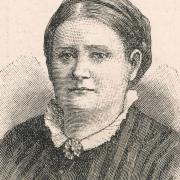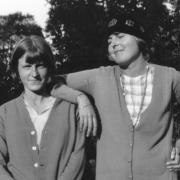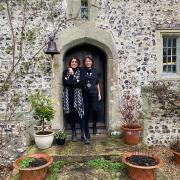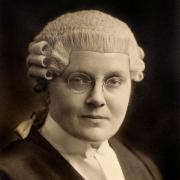As our new prime minister calls on us all to do more for our fellow man and our community, a charity in Sussex could claim to have put the idea into practice well before David Cameron was born. Here Chris Hare tells us more about the proud history...
As our new prime minister calls on us all to do more for our fellow man and our community, a charity in Sussex could claim to have put the idea into practice well before David Cameron was born. Here Chris Hare tells us more about the proud history of Worthing’s Council of Social Service, now Guild Care
In 1933 Britain and the world were facing challenging and dangerous times: the Wall Street Crash of four years earlier had led to the Great Depression and mass unemployment; while politically, people were being attracted to extreme positions, with Hitler coming to power in Germany and Oswald Mosely establishing the British Union of Fascists in Britain. Yet amid the chaos and the fear, small groups of charitably minded people across England were responding to the crisis in a practical and effective way, by establishing what were known as Councils of Social Service. These voluntary organisations drew together charities, churches, Rotary Clubs, and others in a single effort to relieve distress and give people suffering from unemployment, illness and disability the chance to improve their lives through self-help.One Council of Social Service, established at Worthing in 1933 proved to be one of the most innovative and successful in the country. By the end of the decade the support and help offered by the Worthing Council of Social Service (known today as Guild Care) to people in distress was proving an inspiration to other councils around the country. Led by a doughty and tireless honorary secretary called Effie Methold, Worthing was able to introduce social services not generally seen in this country until the creation of the Welfare State in 1948.
These services included free school milk, free dental treatment for adolescents, grants and loans to those facing financial hardship, a soup kitchen, legal aid, subsidised or free footware for those on low incomes, a ‘Rest Cottage’ where those recuperating from illness could recover, and a Citizens Advice Bureau. The really remarkable aspect of these endeavours is that they were not financed by central or local government, but were a cost borne by local individuals, known as ‘subscribers’, who pledged a certain amount every year. When the economic crisis worsened in the winter of 1938/39 and unemployment locally reached record levels, these subscribers responded to appeals by giving more generous donations.Yet this generosity alone could not have financed these ambitious programmes. Many local professionals were encouraged by the ever-persuasive Mrs. Methold to donate their skills and time free of charge, or for a considerably reduced fee. So it was that dentistry, legal advice and what we would now call ‘respite’ care was made available to the unemployed and those on low incomes.Worthing Council of Social Service owed a great debt to its honorary secretary, Mrs. Methold, but its success was also due to many local worthies, who, over a period of not just years, but decades, gave freely of their time, chairing committees and fund-raising. Noteable among these, were Sir Arthur Linfield, prominent Rotarian and businessman; Rev. Edmund Haviland, rector of Heene, who had pioneered modern ideas of social service at his former parish of Selly Oak in Birmingham; and Frank Cave, editor of the local newspaper.
Frank Cave was the editor of the Worthing Herald for 1932 until 1967, and remained an active member of Worthing Council of Social Service until his death in 1992. Cave was a man of whom it could be said ‘he did not suffer fools gladly’, and he certainly made waves. Yet behind an often gruff exterior was a kindly man determined to do the best for his community. One thing Cave recalled in particular was the miserable condition in which many old people were living in during the 30s. With no savings and only limited access to health care, many elderly Worthing residents ended their days miserably. It is heart-rending to read through the records of the times, in which the infirmities of those who received assistance are itemised. A picture of a bed-ridden, arthritic invalid with poor sight and hearing is frequently presented, living in one, often squalid room. What really astonishes the modern reader is that these people far from being in what today would be considered extreme old age, were often only in their sixties or even late fifties: aged beyond their years by a life of unremitting toil.In 1943 Frank Cave, aided by local benefactor, Charles Whitcomb, established a residential home for elderly widows on small incomes. This was to be the first of many such homes that would become the jewel in the crown of the charity we know today as Guild Care. These homes still flourish in the town and are acknowledged to be some of the best in the country. They are an enduring legacy to Frank Cave and his vision of dignity in old age. The main difference between today and 1943 is that the modern residents are in their 80s and 90s rather than their 60s and 70s – testimony to the huge increase in longevity and good health that has occurred over the last 70 years.
Chris Hare’s book Through The Hard Times and the Good, an oral and social history of Worthing from all good booksellers, price �10.
Guild Care Today
Guild Care in 2010 provides an extensive range of innovative services for older people, people with dementia, carers and children with disabilities in Worthing and the surrounding areas.
The charity runs the innovative Healthy Living Programme for older people and carers at centres in Worthing. Users of the service benefit from all manner of social activities, exercise, therapies, massage, healthy lunches, games and crafts, art and poetry groups, singing, bingo or just meet friends over a coffee and cake.
The organisation has four care homes with nursing ~ Linfield and Caer Gwent are their feature homes while Ashmount and Irene House provide places for people who receive state funded support. The charity runs a professional home care service for private and state funded clients who require personal care and domestic help.
Carers of people with dementia benefit from ‘Time Out for Carers’, a valuable respite service every Monday and Thursday and for families with disabled children the Ashdown Club is open on Saturdays and during school holidays.
Guild Care hosts the Carers Support Service for Worthing and District which handled over 4,500 enquiries last year from carers.
The charity is currently running trying to raising �120,000 to support both the Healthy Living Programme and the Ashdown Club.
For more details please visit www.guildcare.org orcall 01903 528600.


























